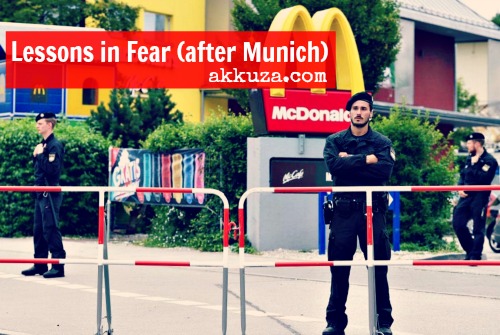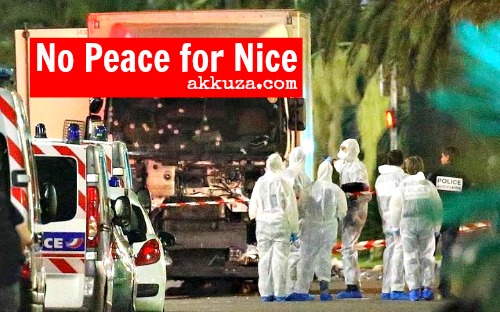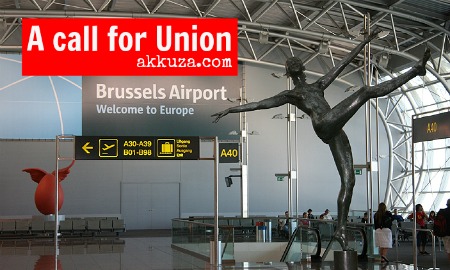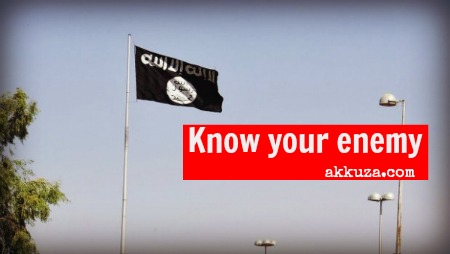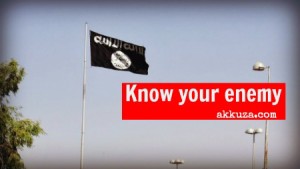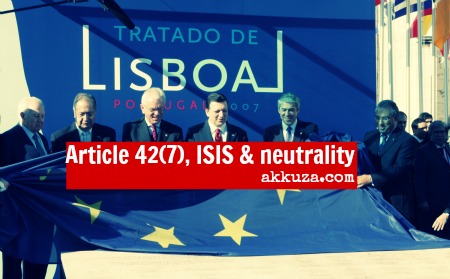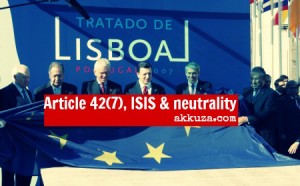It’s a new thing now. Not Pokemon I mean, but this habit to drop “and Munich?” in conversation without as much as a semblance of intent to actually engage about the matter beyond signalling a mutual acknowledgement of the existence of yet another horrible event marking the simultaneous deaths of multiple human beings. “And Munich?” dropped at some part of an exchange is meant to imply a plurality of emotions, feelings and thoughts without actually dealing with them. In post-fact, emotion driven society there is a whole series of “taken as reads” packaged in a two-word reference.
“And Munich?” means that they have stricken again. It means that we are condemned to live another series of days in anxious attention watching the news to hear about how yet another subset of innocent victims had their lives cut short and how the state can do nothing or seems to be unable to do anything about them. “And Munich?” means that the terrorists are winning the war and that all we can do is share a feeling of helplessness as the multi-headed hydra strikes again with wanton abandon and without any recognisable pattern. “And Munich?” definitely implies that the refugee/immigrant problem is out of hand and that whether we like it or not it must be stopped. “And Munich?” includes the sentiment that now even Merkel’s Germany is no longer safe from gun or truck wielding maniacs so why should we be safe? “And Munich?” insinuates that we are living under constant siege and in constant fear and that nothing seems to be able to save us.
Therein lies the problem. Social discourse prefers not to engage but rather to wallow in emotional dysfunctionalism. There is no effort to define beyond the effortless generalisations and assumed truisms that sweep everyone and everything under the same carpet and into the same media-wrapped boxes of cliches. Munich showed us the direction in which we are moving when it comes to fear-based social reasoning.
The first clues came with the breaking news. “Shooting in Munich” did not need any further elaboration. We, and when I say we I mean the global media village’s spectators, were already braced for the worst. A series of automated events were expected to be put into place. “The escalation”, “the police reaction”, “the heroes on scene”, “the vindication”, “the first amateur videos and reports”, “the rise in number of reported victims”, “the stand off”, “the resolution”, “the global political condemnation”, ” the solidarity and mourning” and of course “je suis Munich”. All these steps were in place in our collective minds once the our medium of choice tweeted us the breaking news that there had been a new “Shooting in Munich”.
Then came the early analysis as the events continued to unroll before our eyes. Munich Police stated that since a man had wielded a gun in public this had to be treated as a terrorist attack in order to mobilise the maximum resources to counter its effects. It was an interesting honest statement at a very early stage. As far as I can recall it is the first time that while we had an “attack” in progress we were given direct access to the security protocols of the nation in question. The official reaction is, rightly I add, tuned to assume that we are dealing with a terrorist of the organised (ISIL) type and then question that assumption later. The reasoning is clear and pragmatic – in the worst case scenario the security forces are right and they have all the means to deal with the issue. In the best case the attack is not really a terrorist attack but one that seems to be so due to the circumstances and still all means have been deployed to minimise the damage.
It turns out that the Iranian born 18-year old who went on a shooting spree in a shopping district of Germany’s third largest city was actually emulating a Norwegian far-right madman who had gone on a shooting spree among a group of political youths on an holiday island in Norway. The Iranian was more Breivik and less Daesh. Yet we would only find that out over 24 hours after the events. As it turns out, the Munich police deployment of security measures – blockdown on transport, curfew, assumption of other shooters involved in the attack – may have saved more lives and contained the damage. Similarly, the social mindset as the events unfolded demonstrated a “trained” mentality among the general public. Twitter hashtags offered support and shelter to anyone stranded in the potential zone of carnage, Facebook triggered a fine-tuned function that helped people show that they are safe and sound, the media (or most of it) knew better than to defy police instructions not to share videos and images at the peak of the crisis.
So what lessons do we draw from the Munich attack? Early the next morning I put the following post on facebook:
One of them is as old as the word itself: it takes FEAR and TERROR to make a TERRORIST. Not ISIL, not an organised network of sharpshooting ideological maniacs, not immigrants who got in under the radar with intent to kill, not far right extremists with an agenda. Those are all masks and labels that hide the real danger – misfits, renegades, angry individuals who will prey on the new mindset of fear. One man with a gun is no longer a criminal – he is a terrorist (hasn’t crime always spread terror?) and the third largest city in Germany is locked down. The biggest cause of fear is lack of knowledge. Today’s society needs new ways of responding to these realities. Part of that development lies in understanding how and why all this is happening.
I do believe that is our biggest lesson yet. We have come to realise that due to a combination of circumstances that include the immediacy of breaking news and coverage we are a society that easily falls prey to fear and helplessness. Crimes and criminals that involve deaths and victims are no longer to be treated “simply” as such but as part of a wider bigger problem that is holding all of society at ransom. the new crime of “terrorism” is like nothing that we have ever seen before – mainly BECAUSE of the immediacy of the breaking news when the situation is no longer limited to the immediate closeness of wherever the events unfold but involves a whole global community. This sense of communal fear and helplessness was previously not achievable by similar groups as ISIL operating on the basis of terror and fear – the IRA, the Brigate Rosse, Bader Meinhoff, the PLO.
This psychological hostage situation is exacerbated because all the while society will carry on with its own agenda and there will unfortunately always be the misfits, the renegades and the angry individuals who will commit crimes that would in all other circumstances not qualify for the “terrorist” moniker but that will henceforth contribute to the generation of mass hysteria and uncertainty. It is important for all of society to take time and understand such acts – in order not only to be in a position to better react to them in the future but also to try, as far as possible to avoid them ever happening.
The best way to fight fear is with knowledge.
